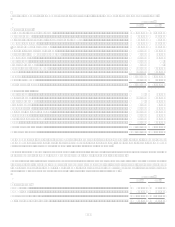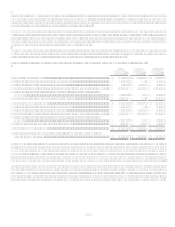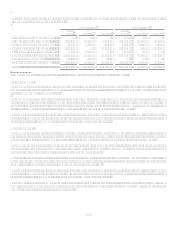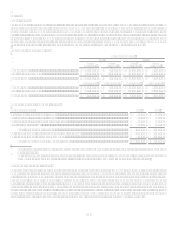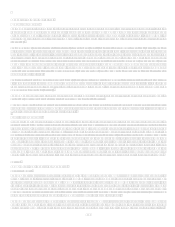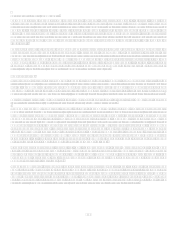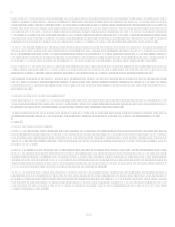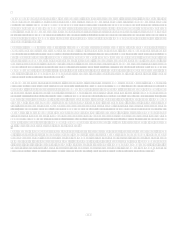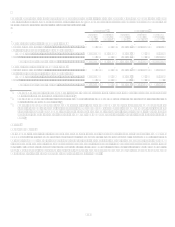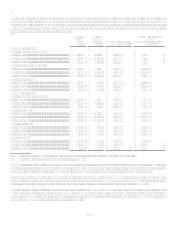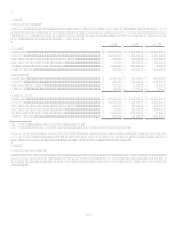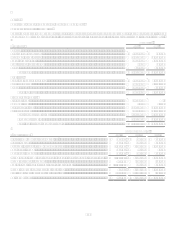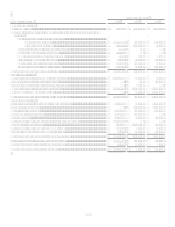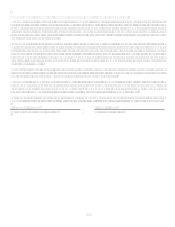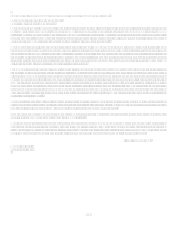Capital One 2008 Annual Report Download - page 162
Download and view the complete annual report
Please find page 162 of the 2008 Capital One annual report below. You can navigate through the pages in the report by either clicking on the pages listed below, or by using the keyword search tool below to find specific information within the annual report.144
Loan and Line of Credit Commitments
The Companys discontinued wholesale mortgage banking unit, GreenPoint, previously sold home equity lines of credit in whole loan
sales and subsequently acquired a residual interest in certain special purpose entities which securitized some of those loans. Those
special purpose entities had aggregate assets of $140.3 million at December 31, 2008, representing the amount outstanding on the
home equity lines of credit at that date. As residual interest holder, GreenPoint is required to fund advances on the home equity lines
of credit when certain performance triggers are met due to deterioration in asset performance. GreenPoints ability to recover the full
amount advanced to customers is dependent on monthly collections on the loans. In certain limited circumstances, such future
advances could be reduced if GreenPoint suspends the right of mortgagors to receive draws or reduces the credit limit on home equity
lines of credit.
There are eight securitization transactions where GreenPoint is a residual interest holder with the longest draw period currently
extending through 2023. GreenPoint has funded $15.6 million of advances through December 31, 2008 related to these transactions.
The Company believes it is probable that a loss has been incurred on several of these transactions due to the deterioration in asset
performance through December 31, 2008. However, the Company cannot estimate the possible loss or range of loss at this time. The
maximum potential amount of future advances related to all third-party securitizations where GreenPoint is the residual interest holder
is $207.3 million, an amount which represents the total loan amount on the home equity lines of credit within those eight
securitizations. The total unutilized amount as of December 31, 2008 is $67.0 million.
Industry Litigation
In accordance with the provisions of SFAS No. 5, Accounting for Contingencies, (SFAS 5), the Company accrues for a litigation
related liability when it is probable that such a liability has been incurred and the amount of the loss can be reasonably estimated. In
addition, the Companys subsidiary banks are members of Visa U.S.A., Inc. (Visa). As members, the Companys subsidiary banks
have indemnification obligations to Visa with respect to final judgments and settlements of certain litigation against Visa (the Visa
Covered Litigation). The Company accounts for its indemnification obligations to Visa in accordance with the provisions of FIN 45.
Over the past several years, MasterCard International (MasterCard) and Visa, as well as several of their member banks, have been
involved in several different lawsuits challenging various practices of MasterCard and Visa.
In November 2004, American Express filed an antitrust lawsuit (the Amex lawsuit) against MasterCard and Visa and several
member banks alleging, among other things, that the defendants jointly and severally implemented and enforced illegal exclusionary
agreements that prevented member banks from issuing American Express cards. The complaint requested civil monetary damages.
The Company and two of its subsidiaries were named as defendants in this lawsuit. On November 7, 2007, Visa and American
Express announced that the Amex lawsuit had been settled and that the remaining bank defendants named in the lawsuit, including the
Company and its subsidiaries, would be dropped as defendants and released from all claims asserted in the lawsuit. The Company
recorded an expense of $79.8 million in the fourth quarter of 2007 in connection with the settlement of the American Express
litigation. That amount includes $48.0 million related to the settlement of the Companys liability and $31.8 million related to the
Companys share of damages as a Visa member, which was recorded in accordance with the provisions SFAS 5. Both amounts are
included in other liabilities within our consolidated balance sheet at December 31, 2007 and are reported in other non-interest expense
within our consolidated statement of income for the year ended December 31, 2007.
In 2004, Discover Financial Services filed an antitrust lawsuit (the Discover Lawsuit) against MasterCard and Visa alleging, among
other things, that exclusionary agreements in the MasterCard and Visa rules prevented their member banks from issuing Discover
cards. In October 2008, the parties announced a settlement of the lawsuit. The Company and its subsidiaries were not defendants in the
Discover Lawsuit, but the lawsuit qualified as Visa Covered Litigation. The settlement did not have a material impact on the
Companys operations or financial condition.
In 2005, a number of entities, each purporting to represent a class of retail merchants, filed antitrust lawsuits (the Interchange
Lawsuits) against MasterCard and Visa and several member banks, including the Company and its subsidiaries, alleging among other
things, that the defendants conspired to fix the level of interchange fees. The complaints seek injunctive relief and civil monetary
damages, which could be trebled. Separately, a number of large merchants have asserted similar claims against Visa and MasterCard
only. In October 2005, the class and merchant Interchange lawsuits were consolidated before the United States District Court for the
Eastern District of New York for certain purposes, including discovery. Discovery is proceeding in these cases.


